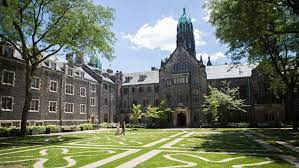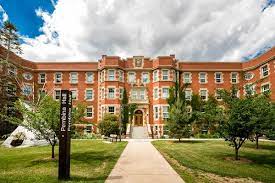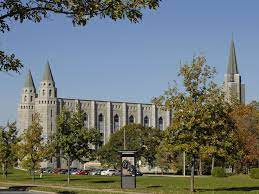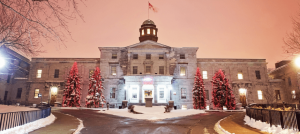A few years ago, it was hard to imagine that a Nigerian student could get a quality education at one of the best universities in Canada.
That’s because, at the time, the country restricted most Canadian university admissions to citizens or permanent residents of Canada who had lived there for at least seven years. But now, thanks to changes in immigration policy and a growing number of international students coming to study in our country, this isn’t the case anymore.
If you’re a Nigerian student interested in studying in Canada, you might wonder which universities offer the best opportunities for your studies and career goals.
In this article, we’ll discuss some of the best universities in Canada for Nigerian students so that you can make an informed decision about whether or not they’re right for you, so stay glued!!
See Best University In Nigeria To Study Mechatronic
Why Should a Nigerian Study At a Canadian University?
- Benefit from the welcoming immigration pathways: With the right and required papers, the entire immigration process is not onerous. Yes, Nigeria Student Express (NSE), a pilot program for Nigerian aspirants who have been brought to a Canadian post-secondary institution, allows anyone from Nigeria to enter Canada. For its welcoming immigration policy, Canada is well-known and respected. The biggest benefit of choosing NSE is that it can reduce the time it takes to obtain a study permit from eight weeks to 20 days.
- Superior educational standards: Who is unaware of this compelling fact? Yes, the quality of education in Canada is what most people think about first. Nigerians who wish to stand out with exceptional academic standards should choose Canada. You will all have a globally recognized credential and be qualified for employment wherever.
- You explore a variety of cultures: Students from all around the world, not only those from Nigeria, are frantically trying to enroll in Canadian universities. As a result, you would have the opportunity to live, communicate, and share with individuals of many ethnicities and religions. The official languages of Canada are English and French, and it has a diverse cultural population. When going to a new country, candidates frequently encounter linguistic obstacles; Nigerian aspirants won’t encounter such issues.
- You’ve arrived in a place full of opportunity: There are strict limitations on students and working while attending school in certain popular study places. A Nigerian student can work and study safely and without limitations in Canada because it is a land of opportunities and has welcoming labor laws. Furthermore, a lot of job openings are available in a variety of industries.
- After completing their education in Canada, Nigerian students can remain there permanently by applying to become permanent residents (PR). With friendly permanent resident legislation, building a pleasant living, doing business, working for the best firms, and so on is simple.
How Can I Study In Canada?
- Select the appropriate institution of higher learning: The first step to beginning your ambition to study in Canada is selecting a suitable university. The best universities in the world are located in Canada, giving you a variety of possibilities. In general, you can narrow down your choices by considering their courses, pricing, the availability of scholarships and tuition exemptions, etc.
- Prepare the necessary documentation: Most universities have standard paperwork that applicants must submit. To save time and effort, it is preferable to be vigilant. The lists of documents that colleges require from Nigerian students are shown below.
- Visa application: Finally, submit your visa and study permit applications. You must begin this application as soon as you receive your offer letter. It’s because Nigerian students can only remain in Canada with a valid visa.
How Do I Get a Student Visa for Canada?
A study permit is required for Nigerian students pursuing higher education in Canada. Students who arrive in Canada can apply for this study permit. Before that, students must get a temporary visa provided by the Canadian High Commission and made easy via the Visa application centre.
Standards for eligibility
- Nigerian applicants must be admitted to the Designated Learning Institute (DLI).
- Students must demonstrate they have the resources necessary to cover their living expenses and tuition fees.
- Students must have an unblemished history and no criminal history.
- You must submit a medical certificate at the time of the interview attesting to your excellent health, and a health check is required.
Documents you should submit.
- Valid Passport: According to the Canadian High Commission, you must have a valid passport for the duration of your stay in Canada.
- Proof of Acceptance by the DLI: A letter of acceptance from the Designated Learning Institution (DLI) is required. The immigration department recognizes particular DLI.
- Candidates must confirm their financial ability: You would be required to demonstrate that you have the financial means to cover the cost of the tuition and housing based on the current requirements.
You should read Best Engineering Schools In Canada
Best Universities In Canada For Nigerian Students
The best universities for Nigerians in Canada are:
- University of Toronto
- Alberta University.
- University of Winnipeg
- Laval University
- McGill University
- British Columbia University
- University of Manitoba
- Calgary University
- Ottawa University
- Montreal University
1. University of Toronto

- Tuition fee: $11,254
The University of Toronto is at the top of this ranking because, per the 2019 Academic Ranking of World Universities, it is now ranked first in Canada and twenty-first globally.
It was established in 1827 and is renowned for its research in artificial intelligence, bone marrow transplants, and regenerative medicine. It grants roughly 700 undergraduate and 200 graduate degrees. International students make up approximately 22.5% of the student body there.
Visit the University of Toronto Here
2. Alberta University

- Tuition fee: $20,395
This Canadian public research university is situated in Edmonton, Alberta, and was established in 1908. The humanities and health sciences are areas where this university excels.
About 7,000 of the 38,000 students enrolled at the University of Alberta each year are from other countries. Approximately CAD 125, or around #40,780 in Nigerian naira, was required for the application fee.
3. University of Winnipeg

- Tuition fee: $9,144
This Canadian public research university is situated in Winnipeg, Manitoba, and was founded in 1871.
Undergraduate students at the University of Winnipeg have access to various programs and possibilities, including courses like a BA in acting or a BSC in computer science.
Visit the University of Winnipeg Here
4. Laval University

- Tuition fee: $22,304
Modern Laval University has a strong educational foundation dating back 350 years. It was established in Quebec, Canada, in 1852 and is the oldest French-speaking university in North America.
They provide well-liked courses in administration, the arts, and science. Over 45,000 students attend the university, with about 5,600 coming from abroad.
5. McGill University

- Tuition fee: $21,006
This public research institution offers courses in English and enrols many overseas students each year. It is based in Montreal, Quebec, and was founded in 1821.
The university bears the name of James McGill, a Scottish businessman whose bequest in 1813 established the University of McGill College, which was eventually renamed McGill University in 1885.
Over 300 different disciplines of study are available at McGill University for degrees and certificates. Every year, they accept about 40,035 students, with over 12,000 coming from outside.
6. British Columbia University

- Tuition fee: $8,322
This Canadian city of Prince George is home to a public research institution founded in the same year.
More than 100 courses are available at the University of British Columbia for undergraduate, graduate, and doctoral degrees.
An estimated 17,000 of the 64,800 students enrolled at this university each year are from other countries.
Visit British Columbia University Here
7. University of Manitoba

- Tuition fee: $11,325
A public research university established in 1877 and based in Winnipeg, Manitoba, Canada, is known as the University of Manitoba.
The university in question is one of Canada’s biggest. With several campuses spread out over the city, its main campus is situated in the Fort Gary region of southern Winnipeg.
When selecting a university in Canada, one should consider the University of Manitoba, which has 30,000 students, 8700 faculty and staff, and 190 alums.
Visit the University Of Manitoba Here
8. Calgary University

- Tuition fee: $22,500
In Calgary, Alberta, Canada, the University of Calgary is a large research university established in 1966.
It has around five campuses, four scattered throughout the Calgary, Alberta, area and one in Doha, Qatar.
The University of Calgary has about 250 programs available throughout its 14 faculties. This school encourages student development in the arts, sciences, and medical fields.
The University of Calgary annually enrols roughly 33,100 students, 4,000 of whom are from other countries.
9. Ottawa University

- Tuition fee: $14, 389
This public research university is situated in Ontario’s capital city, Ottawa, and was established in 1848.
There are many work options for students after graduation due to its position in a city that welcomes students. Canada’s top law school is located at the University of Ottawa.
10. Montreal University

- Tuition fee: $12,000
This university is a francophone institution situated in Quebec, Canada. The colleges of biological sciences and medicine of the University of Montreal are highly renowned.
Each year, the University of Montreal enrols approximately 67,390 students, with about 10,000 international students.
Visit Montreal University Here
What Tests Must You Pass to Study in Canada?
- IELTS: A well-known and widely owned direct evaluation exam, is used to assess IELTS English competence, a crucial entrance requirement. Therefore, IELTS test results are required by Canadian universities for applicants from Nigeria. 5.0 to 7.0 is the range for a valid IELTS score. The courses and universities you plan to apply to will largely determine this.
- TOEFL: TOEFL scores are one of the crucial prerequisites for enrollment in Canadian universities (Test of English as a Foreign Language). It evaluates candidates’ suitability for study or employment in settings where English is the dominant language of exchange. A minimum TOEFL score of 580 is required for the most popular university in Canada.
- Need for PTE: PTE certifications are accepted by most Canadian universities. It is a successful method of supporting your acceptance letter from recognized Canadian study institutions. To enrol in a university, a Nigerian student must have a PTE score between 50 and 63.
Tips and Requirements for Nigerian Students Looking to Study in Canada
Now that we know the Canadian universities that accept Nigerian students, we can see that you must meet guidelines and prerequisites to enroll in any of these schools.
Let’s quickly examine the following;
Tip 1: Gather the required paperwork and get it ready.
The following are fundamental prerequisites that Nigerian students must meet to enrol in a Canadian university:
- Academic history Letter of recommendation (s)
- An international passport and an English proficiency test, such as IELTS
- passport picture
Tip 2: Double-check and validate the specific document that is needed.
- Every institution has different specifications. Therefore students must learn what their preferred school is looking for.
- Visit the school website, where information is frequently disseminated to current and prospective students, or, even better, get in touch with the appropriate university office.
Tip 3: Complete and submit an application form:
- The following action is to complete an application form. For a price, application forms are typically available on the university website.
Tip 4: Prepare your finances.
- After being accepted, the university will send you several pieces of paperwork with your tuition and other expenses.
- Second, you’ll need to pay for books, a flight, food, lodging, etc. You will spend a lot of money on the procedure.
- In order to confirm that you and your family can afford your education until graduation, certain colleges may also ask you to submit information about your financial situation and that of your family.
- This does not apply to students receiving scholarships or grants because the host organization will fulfil the requirement. Because of this, it is advised that anyone wishing to study abroad always apply for scholarships.
Tip 5: Prepare your visa.
- When you are offered admission, prepare your visa immediately because you need one to enter the country.
Frequently Asked Questions
How far in advance should I begin planning to study in Canada?
It is advised that Nigerian students who intend to study in Canada start making plans 4 to 1 year in advance. This is crucial because it could take CIC up to 3 months to process a Nigerian student’s application for a study visa to Canada.
How long does it take to receive a Canadian student visa?
You should apply as soon as possible because the application process for a Canadian study visa could take up to 3 to 5 months. The length of time varies depending on the country where your application is handled, the kind of application (online or paper), and the volume of applications CIC receives.
By submitting your application to the Canadian educational institution early, you can ensure that you will have the documents you need (a letter of acceptance) when it comes time to submit your visa application. This will help you avoid the risk of last-minute visa applications.
This will guarantee you enough time to prepare the essential documents and fulfil the other requirements for your visa application.
Are students allowed to work in Canada?
Yes. You can work full-time (40 hours per week) during the regular school breaks and vacations as an international student but only part-time (20 hours per week) throughout the academic year.
Additionally, foreign graduates from Canadian colleges and universities can work for up to three years in Canada after they complete their education.
Does it get that cold in Canada?
The weather will undoubtedly feel different if you’re from a tropical region. The infrastructure, however, is prepared for the cold, including heated hotels and heated public transportation (buses/trains), so you’ll be fine.
Furthermore, you must dress appropriately for the weather. During your pre-departure briefing and orientation, our educational consultant will discuss this further.
Conclusion
In this post, we’ve outlined the best universities in Canada for Nigerian students. We hope you’ve found it helpful!
If you’re still looking for more information about Canadian universities and admission requirements, check out each university’s official website!
